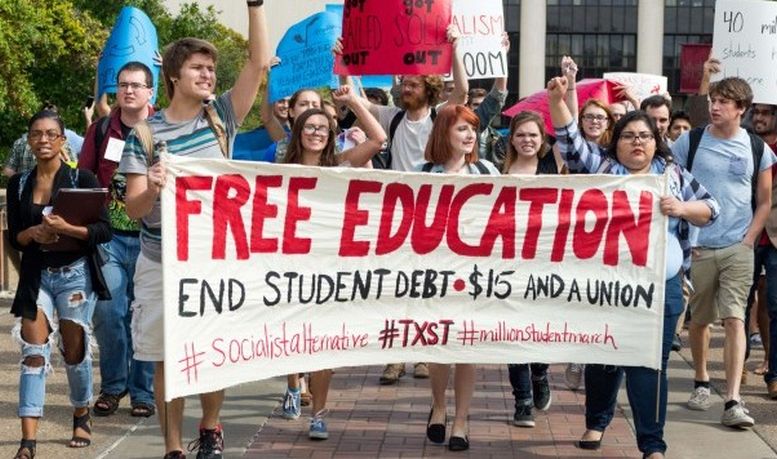As post-secondary students begin a new semester, many will be thinking about what they expect to get out of their education. Some students are driven by curiosity and a genuine desire to gain knowledge, or by the desire to make a positive difference in the world.
However, most students are there because they’ve been told they need a degree to get a “good job.” But is this even true anymore? Post-secondary education is getting more expensive, and employers are getting more demanding. Simply having a degree is often not enough. Students are graduating, saddled with thousands of dollars in debt and struggling to find a decent job.
Education today is bought and sold as a commodity and “marketed” as an “investment.” It is a commodity. Students pay thousands of dollars in tuition fees, hundreds of dollars on books and have to pay for rent and food. They spend years doing coursework for a piece of paper they hope will get them that good job. Students are slammed with piles of homework that many struggle to manage, especially if they have to work part-time to pay rent. There are many opportunities for extracurricular activities, but is there time to fit them in with everything else, including the pressure to do “volunteer work” to attract future employers?
Most institutions offer mental health services to students. This can be valuable and make a big difference in students’ lives. But a lot of mental stress is due to heavy workloads and financial worries. Institutions could go a long way towards improving students’ mental health by limiting coursework and lowering tuition, but that never seems to be on the table. Many universities also have a terrible reputation for sexual abuse and harassment that the authorities often ignore or try to sweep under the carpet.
Students are expected to learn in massive lecture halls from professors who usually have no formal training in education. Many professors are more interested in their own research and grant applications, seeing teaching as a chore. Increasingly, students don’t see professors; they are taught by young sessional lecturers living on low pay without job security. So where is all the tuition money going?
The money goes to the bloated university bureaucracy, where executives are routinely paid over $300,000 a year. These executives rarely interact with the students. Instead, they spend their time hobnobbing with rich benefactors and CEOs who make donations to get their name on new buildings. They are concerned with gaining research funding to enhance the university’s prestige, and attracting ever more international students who are exploited with exorbitant international tuition fees.
Increasingly, corporations dominate universities, naming buildings and shaping courses and research. So-called “public” universities in Canada are funded less by governments and more by students, especially international students. From 2008 to 2019, university funding from governments declined from 67 percent to 54.7 percent, while funding from tuition increased from 19.6 percent to 34.1 percent.
Post-secondary education should be free, paid for by raising taxes on the rich. Students and staff should have democratic control over curricula and course offerings, and the level of instruction should be of high quality. The main deciding factor should be the educational needs of the students, not what courses can attract the most tuition dollars.
Student protest can help create social change. During Québec’s 2012 Maple Spring, hundreds of thousands of students and supporters marched in the streets for weeks, forcing the government to abandon their planned massive increase in tuition fees. In Chile in 2019, student protests against transit fares kicked off the mass movement against neoliberalism and led to the defeat of the government.
Socialist Alternative Youth is building clubs in colleges and universities to bring together students who want to fight for better conditions on and off campus. We need a socialist transformation of society to end all forms of oppression, fight climate change, and fight for a better future. Join Socialist Alternative Youth!




